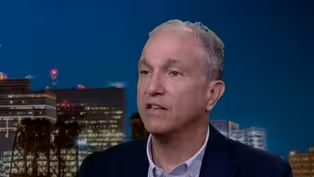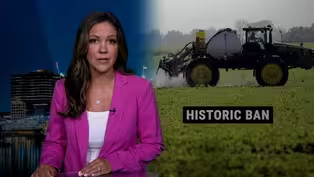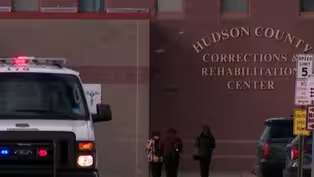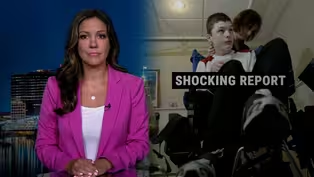NJ Spotlight News
Changes to school aid were supposed to ease property taxes. Here’s what really happened
Clip: 8/8/2024 | 5m 29sVideo has Closed Captions
Analysis of NJ property taxes in the seven years since the formula for state aid to school districts
Analysis of NJ property taxes in the seven years since the formula for state aid to school districts was revised.
Problems playing video? | Closed Captioning Feedback
Problems playing video? | Closed Captioning Feedback
NJ Spotlight News is a local public television program presented by THIRTEEN PBS
NJ Spotlight News
Changes to school aid were supposed to ease property taxes. Here’s what really happened
Clip: 8/8/2024 | 5m 29sVideo has Closed Captions
Analysis of NJ property taxes in the seven years since the formula for state aid to school districts was revised.
Problems playing video? | Closed Captioning Feedback
How to Watch NJ Spotlight News
NJ Spotlight News is available to stream on pbs.org and the free PBS App, available on iPhone, Apple TV, Android TV, Android smartphones, Amazon Fire TV, Amazon Fire Tablet, Roku, Samsung Smart TV, and Vizio.
Providing Support for PBS.org
Learn Moreabout PBS online sponsorshipThe new annual state budget was hailed by Democrats this year for including a record amount of school aid funding.
A spending item that's pitched as a way to benefit students and taxpayers alike.
It increases school aid, are supposed to equal property tax relief.
But an analysis by NJ Spotlight News found property taxes have risen by more than the state average in most districts, including those that have gotten more aid.
For more on the story, I'm joined by our senior writer, Colleen O'Dea.
Colleen, good to see you.
So we've heard this time and again, not just from governors but lawmakers to right that every dollar, every penny that goes toward our schools is a dollar for taxpayers to save in their own pockets.
But, I mean, you looked at the numbers and found that's not necessarily the case.
Yeah.
You know, that's and that was the reason that we looked at because this was something that, Governor Murphy specifically said in his address this year to the legislature.
And Republicans were saying, governor, that's not the case.
So we decided to take a look at it.
And and indeed, you know, if you if you've got more school aid and a lot more school aid over the course of this, this law S2, which is now fully funded after seven years, you you did have less of a chance of getting a high property tax increase, but still, more than half of the districts got had increases higher than the state average, which was roughly 13%.
of the average property tax bill.
Whereas if you got aid cuts or if you didn't, your age couldn't keep up with inflation, then, it was two thirds or more of districts had these large, tax increases.
So, so you're saying taxes went up regardless of whether your school district had an increase or a cut in the aid?
How can that be?
Yeah, it's it's kind of counterintuitive, isn't it?
you know, we know that that school, funding or school spending is not the only driver of property tax increases, but it really is the largest one.
It's typically half or a little bit more than that, depending on the district of your property tax bill goes for schools.
So absolutely, there could have been towns that had issues where they raised taxes or county spending may have gone up.
but certainly schools are the largest, driver.
And it did seem, strange to me that even districts that had and again, we looked at we tried to adjust the aid for inflation, which was roughly 26% over this time period.
And even if you got inflation, you know, an increase in aid more than inflation went up.
Your property taxes more than likely still went up by more than 13%.
Give a give us another example of where we saw where in the state we saw the taxes increase.
And yeah, the students, are now having to pay, you know, fees to participate in high school sports or to be in their drama club at school where the aid was cut.
And so their parents are still feeling the burden.
Where were some examples of that?
Yeah.
So I think the most striking for me was Dover in Morris County.
their aid after again after you adjust for inflation, was up by about a third over, 2017, 2018.
And yet they've had to raise taxes by about 26% over that time.
Or the town has raised taxes about 26% over that time period.
The school district has increased its tax levy.
The amount of money that they request in taxes.
So they've really they've gotten a lot more aid, but they have been forced to, increase school taxes because they are essentially being forced by the state to spend more money on their students.
And so then what's going to happen with with as to our lawmakers talking about taking another crack at the school funding formula, which has been cracked down for decades, and no one seems to be able to find the right solution.
Oh, absolutely.
There were so many, so much discussion this year in particular, because remember, this was the year where the final impact of S2 came into play.
The governor really wanted to fully fund this formula, and he's been very proud that he's done it.
But as a result of that, these districts, it's about 140 districts that, according to the formula, were overfunded during, that I think it's about a seven year period previously, had to kind of essentially give money back.
Yeah.
in terms of, you know, getting these cuts in aid, we talk about Asbury Park, which I think was a really good example of unintended consequences.
It's a town that still has, an income that's lower than the state's poverty rate.
That's higher than the state's, more students in, in need who are getting, free or reduced lunches.
And yet they've had a huge reduction in aid and taxes there have gone up more, more than 50%.
And you can check out your town.
I know Colleen on the website.
You have a whole chart there, for folks to check out in your article.
Colleen OJ, thanks so much.
Thank you.
Bree.
NJ watchdog says residents with disabilities face abuse
Video has Closed Captions
Clip: 8/12/2024 | 7m 57s | New report details troubles, focuses on key areas where progress has stalled (7m 57s)
Boys and Girls Club campers learn water safety
Video has Closed Captions
Clip: 8/8/2024 | 4m 5s | The Boys & Girls Club of Passaic teaches kids lifesaving skills (4m 5s)
EPA bans pesticide linked to fetal health risks
Video has Closed Captions
Clip: 8/8/2024 | 58s | DCPA, or Dacthal, is a weed killer used on crops such as broccoli and brussels sprouts (58s)
Hudson County sued by state comptroller over jail contract
Video has Closed Captions
Clip: 8/8/2024 | 1m 2s | Comptroller: County broke rules in no-bid health care contract (1m 2s)
NJ farmworkers sue for minimum wage, overtime rights
Video has Closed Captions
Clip: 8/8/2024 | 4m 6s | By law, farmworkers are paid $12 an hour and exempt from state's $15 an hour minimum wage (4m 6s)
NJ watchdog says residents with disabilities face abuse
Video has Closed Captions
Clip: 8/8/2024 | 7m 57s | New report details troubles, focuses on key areas where progress has stalled (7m 57s)
Providing Support for PBS.org
Learn Moreabout PBS online sponsorship
- News and Public Affairs

Top journalists deliver compelling original analysis of the hour's headlines.

- News and Public Affairs

FRONTLINE is investigative journalism that questions, explains and changes our world.












Support for PBS provided by:
NJ Spotlight News is a local public television program presented by THIRTEEN PBS





